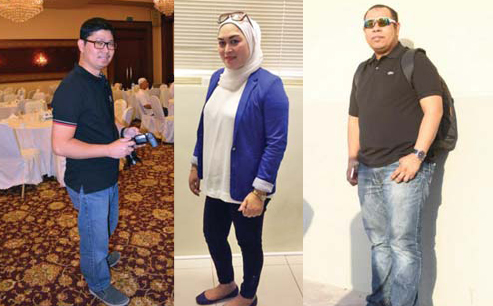 Alvin Baltazar Jocelyn Al-Mutairi and Raz Puning Saurajan
Alvin Baltazar Jocelyn Al-Mutairi and Raz Puning SaurajanAn estimated 5 percent of Filipinos in the Philippines are Muslim, the religion having reached the east Asian islands in the 14th century with Muslim traders from the Gulf. Today, hundreds of thousands of Filipinos work in the Gulf - many of whom were born Muslims and many more who have converted after living and working in the region. Though no official statistics are available, there are a growing number of Filipino converts in Kuwait and the GCC. Kuwait Times spoke with Filipinos here who have converted to learn more about their lives and how they celebrate the holy month of Ramadan.
Alvin Baltazar embraced Islam in 2003. His stepfather who embraced Islam in 2002 worked in Saudi Arabia and Alvin says that is what inspired him to also convert. He had no plan to convert and had many questions like, if God exists. He got the answer from Islam. "I have many questions about the faith I once belonged to. One particular question was if there is God, why can't I feel him?" he said.
"Islam answered all the questions I had after studying it. I converted in the following year," he said. In 2008, Alvin arrived as an OFW in Kuwait. "I was looking for an Islamic community where I can grow more as a Muslim and I stumbled on the KPC Center. There I continued to study Islam and I am glad I can really learn more. I have peace of mind now, I don't question God's existence because I can feel his power, the only God we should give our soul to and who alone deserves our worship," he added.
Like any other faith different from what he had known since birth, he struggled following the tradition and norms of being a Muslim. "I follow the rituals and culture of Islam religiously especially by observing the five pillars of Islamic faith. I was committed to learning and following Islamic teaching, it was hard but I adopted immediately because I accepted it whole heartedly," he added. Alvin, whose wife also lives in Kuwait, works at the Filipino radio service in Kuwait City. He is a role model for many Filipinos who converted to Islam.
Jocelyn Al-Mutairi is another converted Filipino Muslim married to a Kuwaiti. "My husband never interfered with my belief. He never asked me to stop going to the church," she said. But her life changed after listening to the Quran teachings. "I was a very unforgiving person. I do not know what happened when one day I just decided to listen to an English sermon about the Holy Quran. It struck my heart and I found myself looking for that particular person that I hate most just to tell how happy I was to forget and forgive his lapses. I knew I was a changed person from that moment," she said.
From then onwards, she also changed her attire, from a very revealing style to the most simple but also modest attire, covering her hair. "Wearing a hijab was not imposed on me by my husband. I just wanted to cover my hair and I am happy doing it," she said. Jocelyn revealed that she was once upon a time devoted and practiced Christianity. She struggled to change her religion but she finally decided to embrace Islam and is happy about it. She particularly likes to pray five times daily and will follow Islam till final day of her life.
Raz Puning Saurajan is a Muslim by birth. He observes Ramadan wholeheartedly and follows the Sharia law strictly. He is from Mindanao, the birthplace of Islam in the Philippines. He calls himself liberal or an open minded Muslim, he respects all religions and beliefs. His favorite month in the year is Ramadan as he is drawn closer to Allah. "While I follow the Sharia law strictly but I am an open minded person. I do not judge anyone leaving it to God. I like my faith because for me, it's the only religion that can directly talk to God. He gives us the real word for us Muslims to follow," he said.
Raz also believes on the wonders of Ramadan, especially in the last 10 days (Laylat Al-Qadr). "According to the teachings of the Holy Quran, the prayers in the last 10 days are very powerful. It is better than a thousand months, so I follow it seriously every year," he added. Asked about the rituals, traditions he used to follow, or things that Muslims do in the Philippines.
He said, "In the month of Ramadan, we avoid all that is forbidden. Traditionally, in the Philippines we buy new clothes for Eid. We cook some food different from everyday cooking on Eid, but nonetheless the month of Ramadan is really a sacrifice; we are doing it not to show off, but as a responsible Muslim. We don't eat and drink, after all, the reason why we are fasting because we want to experience starvation and eventually learn to share and give," he said.
By Ben Garcia










